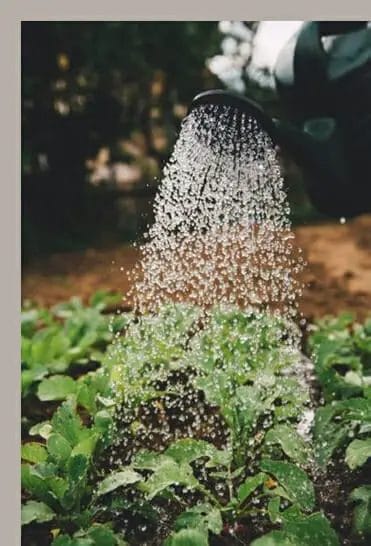When it comes to gardening, there are many things people don't know. For example, how often do you need to water sunflower seeds? How do you know when they're ready to harvest? What kind of soil should you use?
In this comprehensive guide, we will answer all of these questions and more. So whether you're a beginner gardener or an experienced one, read on for some valuable information.
Watering sunflower seeds is one of the most important aspects of growing them. Without water, they will not be able to germinate and grow into healthy plants.

When growing sunflowers, it's important to ensure they receive enough water. During germination, sunflowers need at least 2 gallons (7.6 L) of water per week. Once they start to flower, they'll need less water but will still benefit from being watered regularly.
If you're unsure how much water your sunflowers need, a good rule of thumb is to give them an inch (2.5 cm) of water per week.
This can be done through rainfall or irrigation. Keeping an eye on the soil is always the best way to know how often to water your plants; if it feels dry several inches below the surface, it's time to give your sunflowers a good drink.
Now that you know how often to water sunflower seeds, let's talk about when the best time of day to water them.
Sunflowers are plants that love the sun, so it makes sense that they need to be watered during the daytime. This helps them absorb as much water as possible before the sun goes down.
Watering them in the evening can also work, but it's best to avoid watering them at night. This is because water droplets on the leaves can attract pests, and damp conditions can lead to fungal diseases. Also if you are making a new lawn then you need to know how much water does a new lawn need? Click here to read.

How much water do sunflower seeds need?
Sunflower seeds require quite a bit of water to grow properly. They generally need about 1 inch of water per week, although they may need more or less depending on the climate and soil conditions.
If you're growing sunflowers in areas with hot, dry summers, you'll probably need to water them more often. Conversely, if you're growing sunflowers in cooler, wetter climates, you may not need to water them as often.
What are some tips for watering sunflower seeds?
- Water sunflower seeds during the daytime to absorb as much water as possible.
- Avoid watering them at night, as this can attract pests and lead to fungal diseases.
- If you're unsure how often to water them, a good rule of thumb is to give them an inch (two and a half centimeters) of water per week.
- Check the soil regularly to see if it feels dry several inches below the surface; if it does, it's time to water your sunflowers.
- Water deeply and frequently during germination, and then water less often once they start to flower.
By following these tips, you'll be sure to give your sunflower seeds the best chance of growing into healthy plants.
What are some common problems with watering sunflower seeds?
A watering problem with sunflower seeds is often the root cause of sclerotinia stem rot, more commonly known as white mold. The fungus attacks the stem of the plant, causing it to rot. The early signs of infection are water-soaked lesions on the stem. The lesions will turn brown and dry as the disease progresses.
The best approach to avoid sclerotinia stem rot is to grow your plants in clean soil and water, as well as space them properly in order for there to be adequate air circulation.
If your plants have already been affected by the disease, you can Remove and destroy any diseased tissue, including the roots. You may also try using a fungicide to treat the plants.
What kind of soil should you use?

Perfect soil for sunflowers includes a mix of loam, sand, and organic matter that is well-draining and slightly acidic to somewhat alkaline (pH 6.0 to 7.5).
Do not use garden soil as it could be too heavy and prevent the roots from being able to breathe correctly. You can also add bone or blood meal around the base of your plant for extra nutrients.
How to Keep Your Sunflowers Hydrated
When it comes to watering your sunflowers, there are a few things you should keep in mind. First and foremost, water frequently enough that the soil never dries out completely. If it does dry out permanently, your plant will die.
The amount of water you need to give your sunflowers depends on how big they are and where they are located. Most plants will require 1 cup of water per foot of height each week.
So, for example, if your plant is 3 feet tall (0.9 meters), it will need approximately 3 cups of water over the course of one week. However, if your plant is in an area with poor soil, it will require more than just 1 cup of water each week.
If possible, use rainwater or distilled water instead of tap water if available. This can help prevent fungal infections on the roots due to chlorine or other chemicals found in tap water.
The Best Way to Water Established Sunflowers
The process is quite simple if you're wondering how to water sunflowers already established. The best way to water them is by using a soaker hose or drip irrigation system. This helps ensure that the water goes directly to the roots where it's needed most and helps prevent evaporation.
Sunflowers need about 1 inch of water per week, so use a watering nozzle to easily water once a week until the top 6 inches of soil. You can also tell if they need water by checking the soil moisture; when the top 2 inches of soil are dry, it's time to water again.
If you don't have a soaker hose or drip irrigation system, you can still water your sunflowers effectively by using a garden hose with a sprinkler attachment. Just be sure to move the sprinkler around so that all of the plants get an equal amount of water.
As you can see, watering sunflower seeds does not need to be intimidating. By following these simple tips, you'll be on your way to growing beautiful, healthy sunflowers in no time. So get out there and get watering.
Signs Your Sunflowers Need More Water
Check the soil: If you've followed our advice, your sunflowers should be planted in well-draining soil and watered regularly. When the soil has gone from wet to dry in the top inch or so of dirt, it's time to water again.
Check the leaves: If everything appears okay, keep up with your normal watering routine, but if signs of wilting or drooping appear, don't hesitate to water.
Sunflowers may just want to drink; after being transplanted into a garden bed rather than indoors in pots or containers where they're accustomed to getting watered regularly (or three), it might take them a few days to get adjusted.
Look at the flowers themselves: if you see that flower heads have started turning brown and shriveling up around the edges but still seem healthy otherwise (without any holes punched through them), then chances are good that they just need more water than usual due to some kind of issue with drainage surrounding those particular plants which will probably resolve itself once everything dries out properly again soon enough, but if there aren't any visible signs like these above mentioned here, Then maybe it's time for some action instead.
Why Is My Sunflower Wilting?
If you're new to growing sunflowers, you may have noticed some of your plants wilting. This can happen for several reasons, so it's important to consider what might be causing this situation and how you can help resolve it.
Sunflowers wilted generally means that the plant has been distressed due to various conditions, like intense heat or lack of water (or both). Sunflowers, just like people, need regular watering throughout their day to stay healthy and happy.
However, if they're not receiving enough moisture when they require it the most, they may begin to droop during burning summer days until they gradually die off completely (or as close as we can get these days).
Fa
According to Empressofdirt.net: Sunflower seeds average a germination rate of 75%, so 3 out of every four should sprout.
Frequently Asked Questions:
1. Can you overwater sunflower seeds?
You cannot overwater sunflower seeds. However, sunflowers are very drought-tolerant and only need about an inch of water a week.
2. How long can sunflowers go without water?
Sunflowers can go without water for 20 days after maturing, but they will start to wilt if they don't get enough moisture.
3. Do sunflowers like wet soil?
No, sunflowers do not like wet soil. Instead, they prefer well-draining soil allowed to dry out in between watering.
4. How long does it take to grow a sunflower from seed?
It takes about 80 to 120 days to grow a sunflower from seed.
5. How long does it take for a sunflower to sprout?
It takes about 10 to 14 days for a sunflower seed to sprout.
Conclusion
Sunflowers are a great way to add color and life to any garden; with the right care, they will grow tall and proud. Following our guide on watering sunflower seeds, you can help your sunflowers thrive and produce beautiful blooms all season long.






